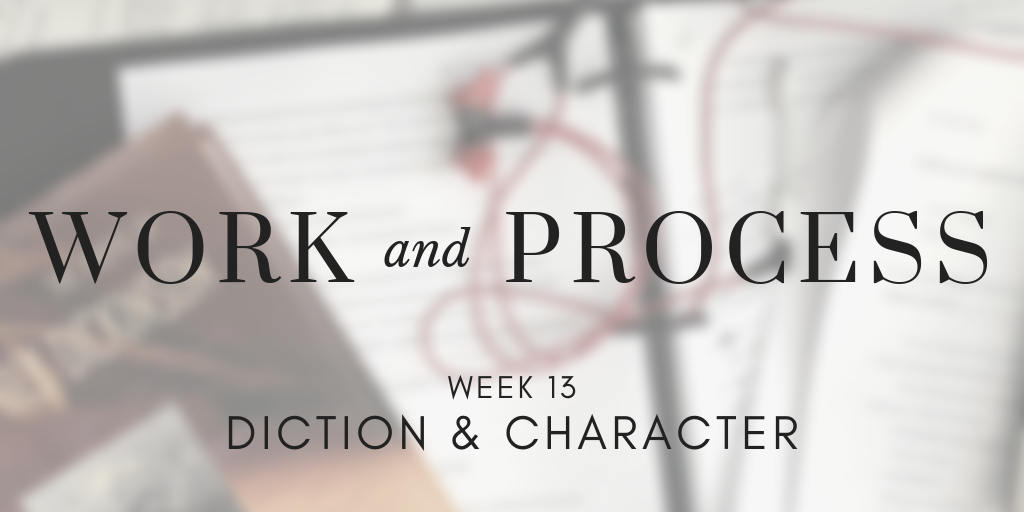|
I don’t think I’ve made any secret of my love of revision--I almost always prefer taking something I’ve got and making it better to making something from scratch. While I enjoy substantive revisions (I just “threw a grenade” on a couple chapters of my current work-in-progress, picked through the ruins, and built up something entirely new and wholly better), I’ve come to realize that I’m happiest doing line edits. All the big changes have been made. All the plots and subplots, character arcs, and conflicts are already there. And all that’s left are the tiny alterations, the fine stitching, the hand-sewn beadwork, the cutting or replacing of a word, a phrase, a sentence. I don’t think I’m this way because I’m obnoxiously attentive to detail (or at least, that’s not the only reason), but because I honestly believe that telling a story at its smallest level (the level of word, punctuation, space, phrase, clause) is as important as telling a story at the level of plot or character. For me, that’s because these little building blocks do as much work revealing character, building atmosphere or tension, or creating theme as any paragraph, page, or chapter. Which is why I’m so excited about the topic for the next few weeks: diction a.k.a. word choice. I think about diction a lot. My most-used tool in Microsoft Word is “Thesaurus.” Probably 50% of my Google searches are definitions and synonyms. I think the words a narrator or character uses can tell us so much about how we’re supposed to react to what’s happening on the page in a variety of ways we probably don’t even think about as we’re reading but certainly feel, in our bones. In fact, diction is such a huge topic for me that I’m going to split it across three posts: diction and character; diction, atmosphere, and tension; and diction and theme. Each week, I’ll delve a bit more into how diction influences these areas of storytelling, and, by the end of it, I hope you’ll have something new to think about or a new way to approach word-craft. Diction and Character A while back, I took a marvelous class on sentence writing with Nina Schuyler, author of The Translator and, most recently, How to Write Stunning Sentences, who classified English words into “high” and “low” registers according to their etymologies (Greek, Latin, Germanic, etc.). Nina explains this far better than I ever could, but the way I adapted it into my writing practice was this: Some words sound fancier, more highfalutin, if you will. For example: elongate, nefarious, grandiloquent. Some words sound plain, or more unrefined. See: grow, foul, overblown. In the extreme, fancy words can signal to readers that a character is educated, a gesture is affected, a setting is classy. Plainer words can let your readers know that a character isn’t well-read, a gesture is choppy, a setting is rough-and-tumble. But in practice, I think using diction to reveal character tends to be much more subtle. In The Reader Trilogy, for example, Captain Reed, an outlaw captain who prefers action to thought or a fistfight to a deep conversation, would call himself “scrappy,” whereas Tanin, the power-hungry leader of an organization dedicated to literacy, would accuse him of being “pugnacious.” But diction that reveals character doesn’t just apply to dialogue where the characters are talking about each other. The words a narrator uses to describe setting or action can also influence our perceptions of characters. For example, The Reader Trilogy is written in close third-person perspective, meaning that although the narrator is not a character in the story (and so tells the audience about the characters using third-person pronouns such as she, he, and they), the narrator does tell us about the world and events through the perspective of one character (or, sometimes, a different character every chapter). And the words that one character uses to filter their experience of the world can tell us a lot about who that character is and what they value. In The Reader, for example, chapters from Reed’s point of view are told in simple, straightforward language: “Sometimes when the Current was in port, he’d climb the mainmast and stand in the crow’s nest while the sun sank, and as the waters turned golden and dark, he’d listen to the sea. They said the water spoke to him. He knew all the natural harbors, the swiftest currents, how to avoid a squall even when it seemed intent on destroying him. Some people even said he could look at the pattern of the waves and tell you where they’d come from, where they were going” (p. 55). Most of the words are short and plain: “sank,” “golden,” “dark,” “squall,” “look,” etc. I think the longest word in this paragraph is “destroying.” There’s little fanciness to the words the narrator uses to describe Reed or his world, because there’s little fanciness to Reed. He’s a character with rough hands and a rough manner. He considers himself a simple man, and he values forthrightness, people who speak plainly, and things he can see and touch with his own senses. The diction in this paragraph helps to convey all of that about him without the narrator having to spell it out for us. In contrast, check out this excerpt from Renée Ahdieh’s YA fantasy, The Wrath and the Dawn, wherein Ahdieh reveals the nature of one of her main characters, Shahrzad, through her masterful use of word choice: “‘I’m sorry--so very sorry,’ [Shahrzad] whispered to [Jahandar] before striding across the threshold to follow the contingent of guards leading the processional. Jahandar slid to his knees and sobbed as Shahrzad turned the corner and disappeared. A few chapters after this, we learn that Shahrzad is a clever and well-educated character of her kingdom’s upper class. Her father, Jahandar, is a former high official, a “curator of ancient texts” (p. 45), and a current librarian, but I’d argue that we can infer much of her background here, from her diction. Notice the higher register language: “contingent,” “processional,” “resounding,” “cavernous,” and “voluminous.” In the clause “Shahrzad’s feet refused to carry her,” Ahdieh uses “refuse,” of Latin origin, over something like “Shahrzad’s feet wouldn’t carry her,” which conveys the same meaning, except “would” is a lower register word of Old English origin. To put it another way, “refuse” is fancier, so Shahrzad herself is fancier. Before we even learn of her background, we see her exercising an extensive vocabulary, choosing ornate words over plain ones, which already tells us so much about who she is and where she comes from. In short, I think words convey big storytelling things like plot and action, but I love that being intentional with your diction can add so much extra depth to your characterization (and without taking up more space on the page!). Next week: DICTION, ATMOSPHERE & TENSION. More words! I think the words you choose can not only reveal the nature and values of your characters, as we talked about today, but also build atmosphere and tension in a scene. Keep this going with me next Sunday at tracichee.com and/or post your own responses with the hashtag #workandprocess. Words matter. <3 Work and Process is a year-long journey of exploring and reflecting on the artistic process, craft, and working in a creative field. Each Sunday, I’ll post some thoughts, wonderings, explanations, and explorations on writing and creativity, and by the end of it, I hope to have 52 musings, examinations, meanderings, discoveries, bits of joy or inquisitiveness or knowledge to share. In each post, I’ll also include a topic for the following week, so if you happen to be inspired to question/wonder at/consider your own work and process, you’re welcome to join me. We’ll be using the #workandprocess hashtag across all social media platforms, and I hope we find each other to learn and connect and transform on our creative wanderings. Comments are closed.
|
ARCHIVES
February 2024
CATEGORIES |


 RSS Feed
RSS Feed